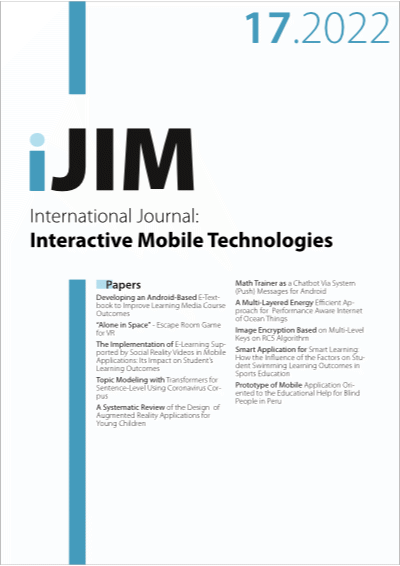A Systematic Review of the Design of Augmented Reality Applications for Young Children
DOI:
https://doi.org/10.3991/ijim.v16i17.31837Keywords:
Augmented reality, design of learning applications, motivation, systematic literature review, young childrenAbstract
Of late, Augmented Reality (AR) has become one of the important tools in teaching and learning, which is made evident by an increasing number of studies focusing on such technology over the past few years. However, studies focusing on the design of AR learning tools or applications for young children have been seriously lacking. Therefore, this paper provides a detailed account of the findings of a study carried out by the authors in which the Preferred Reporting Items for Systematic Review and Meta-Analysis (PRISMA) method was used to select and critically review related articles from two leading databases, namely Scopus and Web of Science (WoS) databases. Overall, 16 articles relating to the design and development of AR learning applications were selected from such databases, which revealed five themes and nine subthemes as follows: (1) information design (with three sub-themes), (2) interface design (with one subtheme), (3) interaction design (with two subthemes), (4) imagination (with two subthemes), and (5) immersion (with one subtheme). As such, all five themes relating to the design aspects of AR learning applications need to be carefully addressed and considered in developing efficacious AR learning applications for young children. In summation, the findings of this study based on the systematic review of the current AR literature can be used as a guideline for developers of AR learning applications to ensure their products can be both efficacious and entertaining, the impact of which can surely improve children’s learning performance, motivation, and interest.
Downloads
Published
How to Cite
Issue
Section
License
Copyright (c) 2022 MASYARAH ZULHAIDA MASMUZIDIN, Associate Professor, Suhazlan Suhaimi

This work is licensed under a Creative Commons Attribution 4.0 International License.



